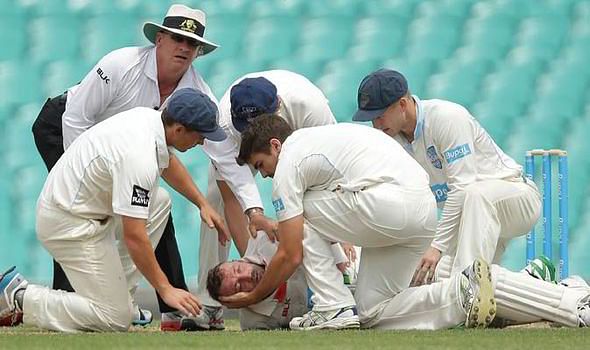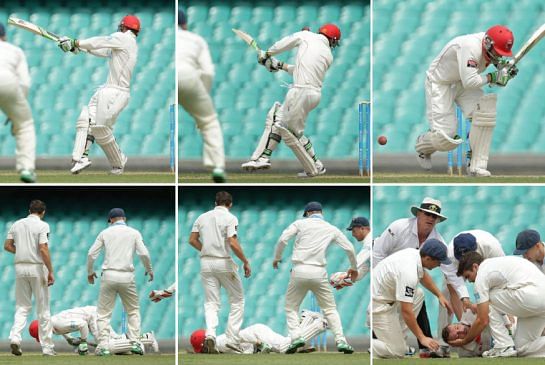Australian batsman Phil Hughes dies
Australian batsman Phil Hughes dies

Australia Test batsman Phillip Hughes has died aged 25, two days after being struck on the top of the neck by a ball during a domestic match in Sydney.
Australian Team Doctor Peter Brukner said he never regained consciousness. .
Hughes, who also played for Hampshire, Middlesex and Worcestershire, was hit by a delivery from bowler Sean Abbott.
"It's an understatement to say we're completely devastated," said Cricket Australia boss James Sutherland.
"The word tragedy gets used too often in sport, but this freak accident is a real life tragedy.
Australia captain Michael Clarke read out a statement on behalf of the Hughes family at a news conference held at St Vincent's Hospital, where the player, who would have been 26 on Sunday, was being treated.
Speaking on behalf of parents Greg and Virginia, sister Megan and brother Jason, he said: "We're devastated by the loss of our much-loved son and brother, Phillip. It's been a very difficult few days.
"We appreciate all the support we have received from family, friends, players, Cricket Australia and the general public.
"Cricket was Phillip's life and we as a family shared that love of the game with him. We would like to thank all the medical and nursing staff at St Vincent's Hospital and Cricket New South Wales medical staff for their great efforts with Phillip. We love you."
A clearly emotional Clarke then stood up and left the room.
Hughes, batting for South Australia, collapsed face first on the ground after being hit by a bouncer from 22-year-old Abbott during a Sheffield Shield game against New South Wales.
Hughes had been wearing a helmet but the ball struck him at the top of the neck, causing the injury.
He had CPR and mouth-to-mouth resuscitation at the ground before being taken to St Vincent's Hospital, where he had a 90-minute operation to relieve pressure on his brain.

Members of the Australian national team, including Clarke, visited Hughes in hospital.
But his death was confirmed in a statement on Thursday.
"It is my sad duty to inform you that a short time ago Phillip Hughes passed away," said Brukner.
"He never regained consciousness following his injury on Tuesday.
"He was not in pain before he passed and was surrounded by his family and close friends.
"As a cricket community, we mourn his loss and extend our deepest sympathies to Phillip's family and friends at this incredibly sad time.
"Cricket Australia kindly asks that the privacy of the Hughes family, players and staff be respected."
Speaking at the news conference, Brukner explained that Hughes had died as a result of "vertebral artery dissection".
He said the artery had been compressed, causing it to split and leading to a "massive bleed" into the brain.
Brukner said the injury was "freakish", adding: "Vertebral artery dissection is incredibly rare. If you look in the literature, there is only 100 cases reported. There is only one previous example caused by a cricket ball."
The Australian flag was lowered to half-mast over the Sydney Cricket Ground where Hughes suffered the horrific injury. Flags were also lowered at the iconic Melbourne Cricket Ground.
Australian Prime Minister Tony Abbott paid tribute to Hughes, describing him as "a young man living out his dreams".
"His death is a very sad day for cricket and a heartbreaking day for his family. What happened has touched millions of Australians," he said.
"For a young life to be cut short playing our national game seems a shocking aberration. He was loved, admired and respected by his team-mates and by legions of cricket fans."
Australia coach Darren Lehmann tweeted: "RIP you little champ, we are all going to miss you! Love, prayers to all the Hughes family."
The England team also released a statement on Twitter, writing: "Our deepest sympathies go out to Phil Hughes' family, friends and team-mates at this incredibly sad time.
"Phil was admired and respected by all he played with and against and will never be forgotten by the cricket community."
Giles Clarke, the England and Wales Cricket Board chairman, added: "He was an extremely popular and hugely respected cricketer in England and Wales not only as a successful tourist with various Australian teams but also as a wonderfully talented county player with Hampshire, Middlesex and Worcestershire.
"He will be missed throughout the world of cricket and today our thoughts are with his family and all those involved in Australian cricket."
Indian icon Sachin Tendulkar, who played alongside Hughes in the Indian Premier League, added: "Shocked to hear about Phil. Sad day for cricket. Deepest condolences to family, friends and well wishers. RIP."
The International Cricket Council (ICC) issued a statement offered its "deepest condolences to the family and friends" of Hughes.
ICC chairman Mr Narayanaswami Srinivasan added: "We are all shocked and saddened with the news of Phillip's passing.
"On behalf of the entire cricket community, I would like to extend my sincere condolences to his family and friends."
Hughes, who had played 26 Tests, made his Test debut at the age of 20 against South Africa in 2009.
In only his second match, he became the youngest batsman to post two centuries in a single Test.
He played county cricket for Hampshire, Middlesex and Worcestershire and shared in what was at the time a world record 10th-wicket partnership of 163 with Ashton Agar against England in the 2013 Ashes series.
He has been tipped for a recall ahead of the upcoming series against India, which is due to start next week.
Cricket Australia had already decided to abandon the latest round of Sheffield Shield matches following the injury to Hughes.
After his death was announced, cricket officials from Pakistan and New Zealand chose to postpone the second day's play in the third and final Test between the two countries.
"It's a sad day for cricket," Pakistan Cricket Board chairman Shaharyar Khan said in a statement.
New Zealand Cricket chief executive David White added: "Cricket is a family. Quite apart from its super-competitive edge, it is a game of kinship, mateship and friendship; of camaraderie and community."
A two-day tour match between a Cricket Australia XI and India, scheduled to be played in Adelaide on Friday and Saturday, has been cancelled.
In English cricket, Thursday's planned release of the 2015 county championship fixtures has also been postponed.
The death of Hughes has inevitably sparked further discussion about player safety in cricket and the use of helmets.
"It's an incredibly safe game, but I think this will shake batsmen slightly out of what might have been complacency," said former England captain and opening batsman Michael Atherton.
"I wore the same helmet for 10 years. I never changed it. I didn't give it much thought really. If there is that kind of complacency that I was guilty of, then I think people will be shaken out of that."
Former England captain Mike Gatting believes everything possible is being done to make helmets safe.
Gatting, who had his nose shattered by a Malcolm Marshall delivery in the West Indies in 1986, described the incident involving Hughes as "just a one-off, a freak accident".